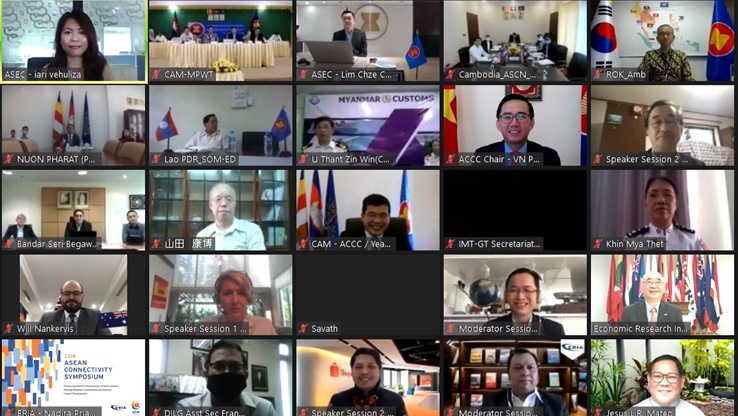
JAKARTA, 28 August 2020 - The Permanent Mission of Viet Nam to ASEAN hosted the 11th ASEAN Connectivity Symposium today on "Enhancing ASEAN Cohesiveness, Responsiveness through Resilient Connectivity and Human Capital Development."
The Economic Research Institute for ASEAN and East Asia (ERIA) and the ASEAN Secretariat supported the virtual symposium which attracted over 150 participants from ASEAN Member States and ASEAN Dialogue Partners, Sectoral Dialogue Partners and Development Partners, as well as international organisations, the private sector and other key stakeholders.
Against the backdrop of the COVID-19 pandemic, the symposium delved into three topics crucial for the regions recovery efforts: strategic investments in sustainable infrastructure and smart solutions; leveraging digital technologies to strengthen supply chain connectivity; and designing education and training for a future-ready workforce.
Panelists from various backgrounds, experiences and expertise joined the discussion.
The Permanent Representative of Viet Nam to ASEAN and Chair of the ASEAN Connectivity Coordinating Committee Tran Duc Binh underlined that since the adoption of the first Master Plan on ASEAN Connectivity (MPAC) in 2010 and the successor MPAC 2025, ASEAN Connectivity has an increasingly important role to support the region in rebuilding and recovering together.
In the face of COVID-19 pandemic, ASEAN Connectivity can contribute more to the recovery efforts by developing critical infrastructure, strengthening digital connectivity and putting people at the centre,? said Ambassador Binh,
He added that a connected ASEAN means a more cohesive and responsive region in facing present and emerging challenges, which would only be possible as we continue to nurture collaboration with our partners and stakeholders in implementing the MPAC 2025.
In his opening remarks, Professor Hidetoshi Nishimura, President of ERIA, highlighted the importance of enhancing the digital economy and digital connectivity in ASEAN and East Asia region to be resilient to various risks for infrastructure and connectivity, including the coronavirus spreads. He said that Digital connectivity enhancement and trade-and-investment liberalisation, improving the institutional connectivity are crucial policies to improve the attractiveness of the ASEAN region as an investment destination. Professor Nishimura also mentioned the importance of Data Free Flow with Trust and human resource development for digital skills as a prerequisite of the digital connectivity development. ERIAs new research project, Comprehensive Asia Development Plan (CADP) 3.0 also features the significance of ICT development for further ASEAN economic integration and ASEAN Connectivity.
Participants exchanged views on the way forward to mitigate the impact of COVID-19 and develop recovery strategies towards a seamlessly integrated ASEAN.
The ASEAN Connectivity Symposium is a flagship annual event that brings together key stakeholders to identify areas of collaboration to enhance the implementation of MPAC 2025.
More information:
